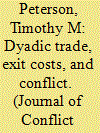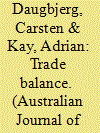|
|
|
Sort Order |
|
|
|
Items / Page
|
|
|
|
|
|
|
| Srl | Item |
| 1 |
ID:
132317


|
|
|
|
|
| Publication |
2014.
|
| Summary/Abstract |
Most studies of the link between dyadic trade and militarized conflict examine the extent of trade interaction. However, interaction measures do not account for the impact of cutting off trade (i.e., exit costs). In this article, I highlight the link between exit costs, the cost of conflict, and "the spoils of conquest," arguing that one state's exit costs are associated with higher incidence of dyadic conflict when its trade partner's exit costs are low. However, its exit costs become less aggravating-and eventually pacifying-as its trade partner's exit costs increase. I test this argument by estimating import demand and export supply elasticities, developing yearly exit cost measures for directed dyads, 1984-2000. Statistical tests confirm that unilaterally high exit costs are aggravating, but that jointly high exit costs are pacifying, a pattern most prominent for trade in strategic commodities.
|
|
|
|
|
|
|
|
|
|
|
|
|
|
|
|
| 2 |
ID:
133645


|
|
|
|
|
| Publication |
2014.
|
| Summary/Abstract |
This article studies the functioning of dispute settlement mechanisms in regional trade agreements (RTAs) and their interaction with multilateral trade institutions. We examine the determinants of formal dispute initiation in RTAs among South American countries. Using an original data set of RTA disputes, we investigate the impact of economic power disparities, domestic political factors, and previous experience on the decision of South American countries to initiate a dispute against a regional trade partner. Our analysis indicates that both power asymmetries and domestic political factors influence the likelihood of dispute initiation at the regional level. We also find strong support for our hypothesis that previous experience in dispute settlement increases the probability that a country will file a complaint against a regional trade partner using regional mechanisms. Perhaps more interestingly, our empirical analysis also uncovers important cross-institutional effects. Prior participation in WTO disputes increases the propensity of states to file complaints at the regional level.
|
|
|
|
|
|
|
|
|
|
|
|
|
|
|
|
| 3 |
ID:
127355


|
|
|
|
|
| Publication |
2014.
|
| Summary/Abstract |
The establishment of the World Trade Organization (WTO) has been widely accepted as representing the legalisation of world trading rules. However, it is important to reflect on the limits of this legalisation thesis in terms of the interface between international and domestic policy processes. By locating trading disputes in a political analysis of policy implementation, it is argued that it is difficult to establish conceptually how the WTO dispute settlement system could have authority separate from and above the conventional international politics of trade policy relations. Instead, the article argues that case outcomes should be expected to be largely the product of domestic political institutions and policy processes, and how these intersect with developments in the WTO dispute settlement system. Brief studies of the Australian government's dispute settlement strategy and two high-profile WTO disputes-the US upland cotton and European Union sugar cases-serve to suggest that the authority of international trade law is not as significant as assumed by the legalisation thesis. Rather, domestic politics and institutions have an important impact on the outcome of trade disputes.
|
|
|
|
|
|
|
|
|
|
|
|
|
|
|
|
|
|
|
|
|